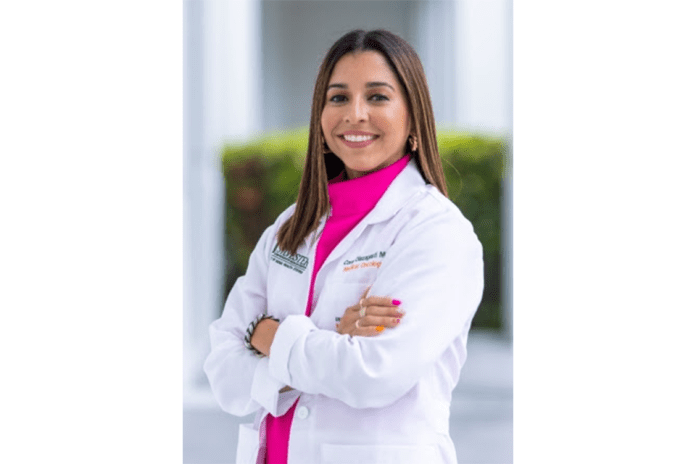
|
Getting your Trinity Audio player ready...
|
Sylvester-led study presented at ASCO highlights biases reported by female cancer physicians
Coral Olazagasti expected a relatively smooth transition when she moved to New York to start her residency after graduating from medical school in her native Puerto Rico. But that proved wishful thinking.
She not only experienced major culture shock, but also her superiors and colleagues often chastised her for speaking too loudly and joked about her accent.
“Puerto Rico is a U.S. territory so when I moved to New York, I thought it wasn’t going to be a big change,” said Olazagasti, now a thoracic medical oncologist at Sylvester Comprehensive Cancer Center at the University of Miami Miller School of Medicine. “But I went through a significant number of adjustments and challenges, and that was a really lonely time. Not many people in my situation were talking about experiencing these challenges.”
Olazagasti wondered if her adjustment struggles while dealing with biases against certain immigrants and ethnic minorities might be shared by other foreign-trained female physicians? So, she decided to explore further.
In a study to be presented June 3 at the American Society of Clinical Oncology’s annual meeting in Chicago, Olazagasti and collaborators from other top-tier cancer centers show female oncologists reported much higher levels of gender or race/ethnicity-based discrimination than their male counterparts.
Layers of discrimination
The researchers surveyed non-U.S. or Puerto Rican oncologists who were either training in a residency or fellowship program in the U.S. or who had completed training and were practicing as independent oncologists. Key findings included:
- More than 50% of female respondents reported gender discrimination during their training or practice, compared to less than 5% of male respondents.
- Nearly 70% of female respondents reported racism or ethnicity-based discrimination during their training, compared to only 38% of male respondents.
- Female oncologists reported more culture shock than did male oncologists, with 65% of women saying they had challenges adapting to American traditions versus 44% of men.
“It’s not surprising to me that women experienced more racial and ethnic discrimination, as well as more gender discrimination,” Olazagasti said. “Society still sees us as inferior to men and that translates beyond our gender to also include our race or ethnic background.”
Olazagasti, who’s also an assistant professor of medical oncology, noted that because the survey relied on self-reporting, some of the results could be due to differences in how men and women perceive discrimination and adapting to cultural differences. For example, women may more readily admit to their struggles than men, even in an anonymous survey, she explained.
Advocating for change
Olazagasti believes representation at all levels is important to overcome these issues. If universities and other employers want to attract and retain more women and racial and ethnic minorities as physicians, they need to ensure these candidates see diversity reflected and celebrated throughout their organizations.
“If you want to create a diverse community and attract people from different backgrounds, you have to have representation throughout all the tiers, up to leadership,” she said.
Olazagasti was looking for that representation when she considered different positions after her training. One of the reasons she chose Sylvester is because she saw many people like her in different leadership positions there.
“One of the big reasons I chose to move to Miami and work at Sylvester is because they’re very welcoming to different backgrounds and different cultures,” she said. “I feel like my identity is celebrated here. It’s important to find a place that celebrates you because they are out there.”
Read more about Sylvester research on the InventUM Blog and follow @SylvesterCancer on X for the latest news on its research and care.
ABOUT US:
For more Miami community news, look no further than Miami Community Newspapers. This Miami online group of newspapers covers a variety of topics about the local community and beyond. Miami’s Community Newspapers offers daily news, online resources, podcasts and other multimedia content to keep readers informed. With topics ranging from local news to community events, Miami’s Community Newspapers is the ideal source for staying up to date with the latest news and happenings in the area.
This family-owned media company publishes more than a dozen neighborhood publications, magazines, special sections on their websites, newsletters, as well as distributing them in print throughout Miami Dade County from Aventura, Sunny Isles Beach, Miami Beach, Coral Gables, Brickell, Coconut Grove, Pinecrest, South Miami, Kendall, Palmetto Bay, Cutler Bay and Homestead. Each online publication and print editions provide comprehensive coverage of local news, events, business updates, lifestyle features, and local initiatives within its respective community.
Additionally, the newspaper has exclusive Miami community podcasts, providing listeners with an in-depth look into Miami’s culture. Whether you’re looking for local Miami news, or podcasts, Miami’s Community Newspapers has you covered. For more information, be sure to check out: https://
If you have any questions, feel free to email Michael@




